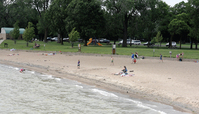A summertime ritual won’t be the same.
Outings to the beach no longer have the same routine.
The ‘new norm’ — at least for the remainder of 2020 — features two issues that local officials say require caution: The ongoing COVID-19 pandemic and the presence of zebra mussels in area waters.
While social distancing is key to combat the spread of the COVID-19 virus at a public setting like a beach, zebra mussels have been a nuisance for a few years now and figure to be for a while.
“At first it was a big issue, but now it’s just something we all have to deal with,” said Sam Schelhaas, a Conservation Officer with the South Dakota Game, Fish & Parks Department.
“It’s part of the routine now.”
COVID-19
For a tourist destination like Yankton is during the spring and summer months, the fight against the spread of COVID-19 has mostly required education.
Common sense — through the use of social distancing guidelines, sanitation procedures and masks — is especially critical, according to Kasi Haberman, Director of the Yankton Convention & Visitors Bureau (CVB).
“It’s a courtesy to other people,” she said.
“One of the first things we mention to people is to make sure you’re keeping distance, and don’t visit if you’re ill or feeling ill.”
With the idea that park rangers and other staff members cannot ‘police’ the beaches in the area, it’s important that people use common sense when it comes to visiting a beach, Haberman added.
While Midway Beach at Lewis & Clark Recreation Area, for example, does not have signs posted warning people of COVID-19, the public beaches at Lake Yankton do have signs posted that beaches remain closed — as of mid-June.
“We hope people remain patient with that,” Haberman said.
There is COVID-19-related information available at the Welcome Center at Lewis & Clark Recreation Area, and the CVB staff has worked with officials on creating banners at park entrances, according to Haberman.
“We’ve used some branding that just says, ‘We’re glad you’re here and please visit our website for more information,’” she said.
The CVB staff has also worked with businesses in Yankton to post messages on large, digital billboards with a similar message: ‘We’re glad you’re here, but please keep safety in mind.’
Unlike other public events, an outing to a beach already presents an inherent social distancing opportunity, according to Haberman.
A location such as a restroom or shower facility, or the marina, could feature a small group, but for the most part, visitors have the ability to distance themselves, she added.
Whether it’s camping or a visit to the beach, there are still opportunities to enjoy those summertime routines that many have come to enjoy, Haberman said.
“That’s one thing drawing people to the state park; it’s an opportunity for people to space out and have their own thing and still enjoy the summer,” she added.
Zebra Mussels
While the COVID-19 virus has brought about a new challenge for park visitors, the ongoing threat of zebra mussels — the small mollusks that are classified as an aquatic invasive species — has been a constant concern.
“Zebra mussels are still here; they’re not going away,” Schelhaas said.
Signs are posted along beaches in state parks in both South Dakota and Nebraska, and they warn beachgoers of the potential injury to bare feet.
Swim socks or water socks are suggested when walking on the beach, the signs along Lewis & Clark Lake and the Missouri River below Gavins Point Dam say.
“It seems like when you step on a rock or log that is submerged, that’s when you cut yourself the most,” Schelhaas said. “You don’t damage your feet by just walking in the sand.”
The mussels, he added, typically attach themselves to hard objects like rocks and logs.
Whereas common sense is required with something like the COVID-19 pandemic, the threat of zebra mussels has brought about guidelines from states to minimize their spread. The mussels move from lake to lake when people accidentally carry them in or on their boats.
In South Dakota, the following guidelines are posted on sdleastwanted.sd.gov.:
* Boaters and anglers are required to open or remove all drain plugs, except when in a boat ramp parking area or when a boat is being launched, loaded or on the water.
* Bait and fish may not be transported away from a boat ramp or the shore in water taken from a lake, river or stream, except while in route to a fish cleaning station located within the parking area.
Ten inspection crews will be out this summer at four checkpoints throughout South Dakota: Four in the Rapid City area and six along the Missouri River.
With the construction this summer of the new aquatic center at Memorial Park in Yankton, local officials believe they will continue to see increased numbers of visitors to beaches this summer, according to Schelhaas.
“We would encourage people to use basic water safety,” Schelhaas said.
Until an invasive species like zebra mussels finds some kind of a balance with the native species, they will remain an ever-present problem, he added.
They’re not only a South Dakota problem, so visitors from other states are hopefully aware of the necessary steps to avoid injury from and
spreading of zebra mussels, Schelhaas said.
“Unless someone can come up with a formula to eradicate them, they’ll be part of life,” Schelhaas said.



